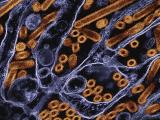Feb 18, 2005 (CIDRAP News) – A World Health Organization (WHO) official confirmed today that the agency is working on a report suggesting that governments consider stockpiling H5N1 avian influenza vaccines, but he stressed that such a stockpile "would not solve the problem" if a flu pandemic emerges.
New Scientist magazine published an article yesterday saying that the WHO was preparing to recommend that governments consider stockpiling H5N1 vaccines. The story depicted that move as a change in WHO policy, saying the agency has previously maintained that a vaccine for pandemic flu can't be produced until a pandemic begins.
Dick Thompson, WHO spokesman on infectious disease issues, confirmed by e-mail today that WHO will suggest possible stockpiling in an upcoming report. But he characterized this as not signaling a major policy change.
"There is a paper which WHO has been developing, which looks at the pros and cons of stockpiling H5N1 vaccine," Thompson told CIDRAP News in the e-mail message. "The paper, which will be formally published in about 4 weeks time, states that those which can (wealthy countries) may want to consider stockpiling H5N1 as part of their larger flu pandemic preparedness as it could serve as part of a first response."
But he said the paper also describes three disadvantages of stockpiling: H5N1 may not match the pandemic strain, the vaccine's shelf life of up to 2 years is relatively short, and, because companies have not yet begun clinical trials, licensing of the vaccine is months away.
"At the same time WHO emphasizes that a stockpile would not solve the problem—that a few million doses in wealthy countries globally still leaves significant gaps," Thompson added. "Therefore all countries should be preparing a full pandemic response, which does not rely on the availability of a vaccine."
The WHO's concern about a pandemic is based on the H5N1 avian flu in Southeast Asia. The virus has caused at least 55 human illness cases, 42 of them fatal, since late 2003.
Thompson also took issue with the magazine article's statement, "Until now the WHO has said that a vaccine cannot be made until a pandemic starts, as only then can it be based on the exact strain of the virus responsible."
Calling this "incorrect," Thomspon wrote, "We have long stated that an H5N1 vaccine could be useful, and have been coordinating with vaccine producers for months to follow the process of H5N1 vaccine development."
A lengthy new WHO report, "Avian influenza: assessing the pandemic threat," says that stockpiling a "true pandemic vaccine" in advance is not possible, because the vaccine must "closely match the actual strain of a pandemic virus and must therefore await its emergence." However, the report says that bulk antigen that protects against the H5 virus can be produced and stored in advance.
Two companies, Sanofi Pasteur and Chiron Corp., are currently under contract to make H5N1 vaccines for the United States. Each company received a contract in May 2004 to make small pilot batches. In September, Sanofi (formerly Aventis Pasteur) received a contract to make 2 million doses. US officials have said that clinical trials of those vaccines are expected to start soon. Chiron is also under contract to make 40,000 doses of an H9N2 vaccine, another flu strain regarded as having pandemic potential.
Thompson said WHO officials met with a number of manufacturers last week to review the status of H5N1 vaccine production, but he provided no information on the results of the meeting.
He also commented that the WHO has not changed its assessment of the risk of a pandemic.
See also:
WHO report "Avian influenza: assessing the pandemic threat"
http://whqlibdoc.who.int/hq/2005/WHO_CDS_2005.29.pdf
Jan 20 report by WHO Secretariat, "Influenza pandemic preparedness and response"
http://www.wpro.who.int/entity/emerging_diseases/documents/docs/B115_44en.pdf

















